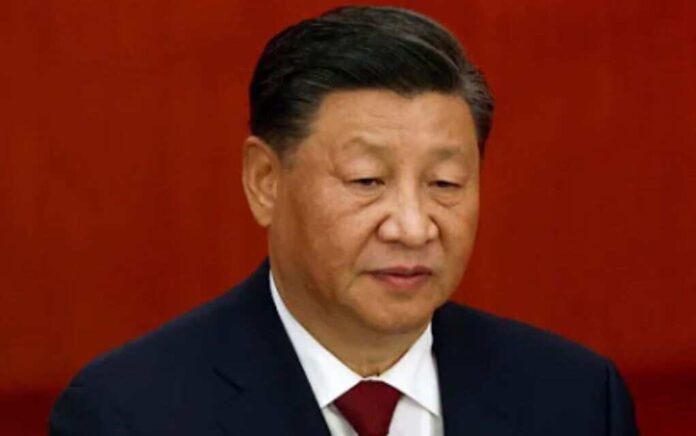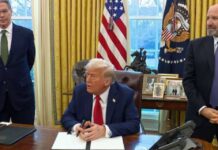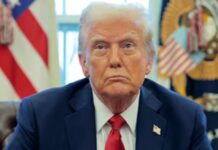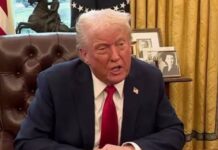
China knows that America isn’t backing down under Trump. Things are different now that he’s back in the White House.
And Donald Trump hits China where it hurts with new order that has them fuming.
Trump Imposes New Tariffs on China in Bid to Combat Fentanyl Crisis; Beijing Retaliates
New U.S. tariffs on China took effect Tuesday as part of President Donald Trump’s strategy to curb the influx of fentanyl into America. In response, Beijing swiftly announced its own retaliatory measures, escalating tensions between the two economic giants.
The 10% tariff on Chinese imports went into effect at 12:01 a.m., just as Mexico and Canada secured a 30-day reprieve from looming 25% duties on their exports to the U.S. The temporary relief was negotiated after both nations committed to bolstering border security measures aimed at disrupting the fentanyl trade.
President Trump declared the fentanyl crisis a “national emergency” last week, invoking the International Emergency Economic Powers Act (IEEPA) to justify the additional tariffs. His administration’s goal is to pressure China into cracking down on the production and export of precursor chemicals used by criminal cartels to manufacture fentanyl for the U.S. market.
“Access to the American market is a privilege,” the White House stated in defense of the tariffs, calling them a “powerful, proven source of leverage for protecting the national interest.” Officials emphasized that Trump’s actions prioritize “Americans’ safety and our national security.”
However, Beijing quickly hit back. China’s commerce ministry announced a 15% tariff on U.S. coal and liquefied natural gas, as well as a 10% tax on crude oil, large-displacement vehicles, and agricultural machinery. These countermeasures will take effect next Monday, further straining trade relations.
Adding to the tensions, China also launched an antitrust investigation into Google on Tuesday, signaling an economic standoff between the two nations.
Some Republican lawmakers have accused the Chinese Communist Party of purposefully fueling America’s fentanyl crisis. The deadly opioid—primarily produced in China and smuggled into the U.S. via land borders, shipping, and mail systems—has claimed at least 281,000 American lives in the past four years, according to the Centers for Disease Control and Prevention.
Beyond the fentanyl issue, Trump has long criticized the U.S.-China trade imbalance, arguing that tariffs will push manufacturers to bring production back to American soil. China remains the largest source of U.S. imports, accounting for roughly 16.5% in 2022, according to the Office of the U.S. Trade Representative.
Beijing, however, maintains that it has already implemented strict anti-narcotics policies and views Trump’s tariffs as a violation of World Trade Organization rules.
“China is one of the world’s toughest countries on counternarcotics both in terms of policy and its implementation. Fentanyl is an issue for the U.S. [sic],” China’s foreign ministry stated Sunday. “The U.S. [sic] needs to view and solve its own fentanyl issue in an objective and rational way instead of threatening other countries with arbitrary tariff hikes.” The ministry further urged Washington to “promote the steady, sound and sustainable development of China-U.S. [sic] relationship.”
Despite China’s protests, the White House insists these measures are not intended to spark a broader trade war.
“President Trump was absolutely 100% clear that this is not a trade war,” Kevin Hasset, the White House National Economic Council, said earlier this week. “This is a drug war.”
Trump has hinted at additional tariffs in the near future, warning that further action could be taken if China fails to comply.
“If we can’t make a deal with China, then the tariffs will be very, very substantial,” Trump stated Monday. He also indicated that import taxes on Chinese steel, aluminum, copper, pharmaceuticals, and computer chips could be next.
Meanwhile, Trump’s decision to delay tariffs on Mexico and Canada followed security commitments from both nations. Mexican President Claudia Sheinbaum pledged to deploy 10,000 national guard troops to the border to combat drug trafficking, securing a 30-day tariff suspension.
Similarly, Canadian Prime Minister Justin Trudeau announced a $1.3 billion initiative to strengthen border security. In exchange, Canada was granted a temporary reprieve from the 25% tariff threat.
But as tensions mount with China, all eyes are on Beijing’s next move—and whether Trump will escalate economic pressure even further.
Stay tuned to The Federalist Wire.



















